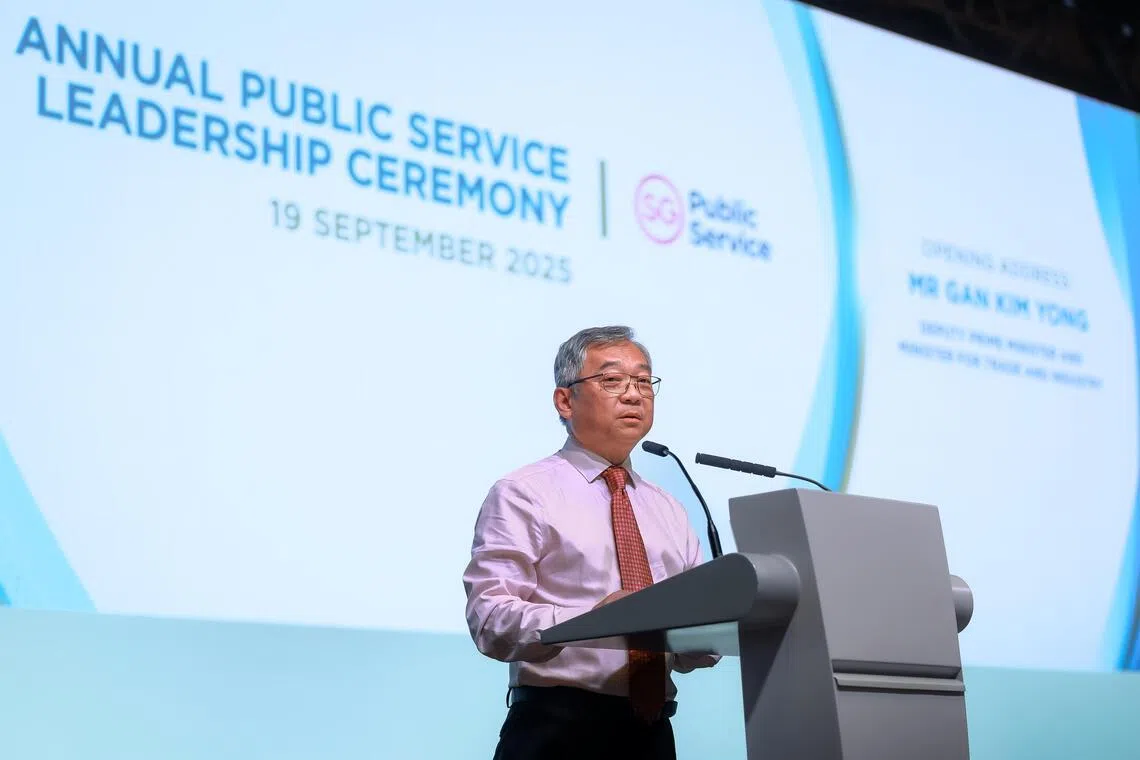Mandatory AI literacy course for all public servants; leaders must be open to using AI: DPM Gan
Sign up now: Get ST's newsletters delivered to your inbox

Deputy Prime Minister and Minister for Trade and Industry Gan Kim Yong speaking at the Annual Public Service Leadership Ceremony held at the Sands Expo and Convention Centre on Sept 19.
ST PHOTO: GAVIN FOO
- Public service officers will undergo AI literacy training to use AI responsibly. Leaders must encourage AI adoption to improve services and governance.
- Public servants should be agile, streamlining business regulatory processes and experimenting with new ideas to foster innovation and manage risks.
- The public service must reinforce trust by addressing vulnerabilities from AI, demonstrating empathy, and upholding Singapore's inclusive values.
AI generated
SINGAPORE – All public service officers will have to go through an artificial intelligence (AI) literacy course to learn how to use it responsibly as the public service enters an AI-driven era.
At the same time, public service leaders must set the tone by being open to using AI in their own work, said Deputy Prime Minister Gan Kim Yong on Sept 19, addressing an audience of more than 850 public service leaders and officers.
They should encourage their teams to do the same, and guide their people to use these tools effectively and thoughtfully, he added.
The push to keep up with AI and use it to govern better was among the three key areas public service leaders must act on that DPM Gan set out in a speech at the Annual Public Service Leadership Ceremony at the Sands Expo and Convention Centre.
The public service must recognise the impact of AI and refresh its approaches for an AI-driven era, said DPM Gan, who is also Minister for Trade and Industry.
Noting how AI is transforming the way economies and societies function, he said: “The public service must not only keep up with these changes, but also lead in applying AI-driven tools to govern better and serve better.”
This would begin with adoption at scale, he said. About one-third of 150,000 public service officers today regularly use Pair, an in-house AI assistant, to support their work in research and writing. More than 16,000 custom AI bots have been created to automate tasks and improve responsiveness.
But AI must be applied meaningfully, said DPM Gan, calling on leaders to challenge their teams to find worthwhile opportunities to use AI-driven solutions to improve services and outcomes.
With stronger capabilities in AI and data, public servants can also detect scams earlier, respond faster to cyber threats, and tackle online harms more effectively.
To achieve these goals, the public service must build deeper expertise by partnering the wider ecosystem
Besides refreshing their approaches for an AI-driven era, public servants must stay agile, said DPM Gan. “We may not have the size or might of larger countries or economies, but in a rapidly changing world, our size can be an advantage if we are able to move fast and respond swiftly,” he said.
One example of this was when an inter-ministry committee
He urged the public service to streamline its regulatory processes for businesses so they can move faster to secure new investments.
Public servants must also be open to experimenting with new ideas, especially in an environment of accelerating technological advancements, so the service can push the bounds of innovation while managing risks responsibly, he added.
The third point was to reinforce trust in a more contested society. The trust between the people and the Government has always been the bedrock of Singapore’s system – built on the belief that the authorities govern fairly, deliver on their promises and always act in Singapore’s best interests, said DPM Gan.
At the heart of this is the commitment to an inclusive Singapore where everyone has a place, and no one group feels left behind, he said.
Amid a more volatile and turbulent global economy, new vulnerabilities will emerge. These could be fresh graduates, gig workers or mid-career professionals, managers, executives and technicians (PMETs) who are more exposed to disruption from AI or automation. Children from low-income families or people with disabilities may also find it harder to keep up with the pace of change, said DPM Gan.
“We must stay vigilant to these potential divides in society, and intervene promptly,” he said. “Most of all, it means sustaining hope – that every Singaporean can still succeed, regardless of their starting point.”
To reinforce mutual understanding and trust with the public, public servants must demonstrate not just competence, but also care and empathy in how they lead, said DPM Gan.
He also highlighted three key strengths of the public service that have helped Singapore transform over the last 60 years – long-term planning, pragmatism, and determination and discipline to carry through with good plans and policies.
At the same event, head of civil service Leo Yip said public servants must better secure Singapore’s interests on the international front through new capabilities, new ways of organising the public service, and developing people and competencies.
Mr Yip also reiterated DPM Gan’s call for public servants to master technology. Leaders in public service must also seek to mainstream AI and digitalisation in core work processes.
Permanent secretaries and senior public service leaders have also undergone training in areas such as modernising digital systems, cyber security and data over the past year.
Mr Yip also called for the public service to continue working together, rather than as disparate ministries.
He concluded by reminding public service leaders to have the courage to do what is difficult and to hold on to their purpose.
“Public service leadership is about expressing and exemplifying this enduring purpose: the purpose of serving Singapore and Singaporeans, improving lives and making Singapore better,” he said.



